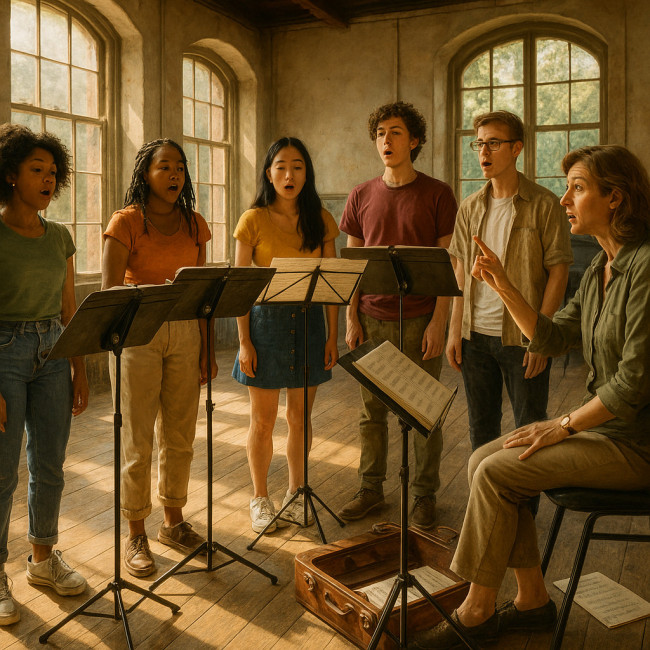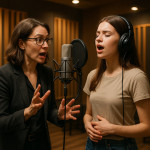Funding tips for external singer training: grants, residencies and scholarships
Dreaming of levelling-up your vocal skills without draining your savings? This guide walks you through the smartest ways to secure grants, artist residencies and scholarships for external singer training. You will learn where to search, how to position your project, and the budget tricks that convince funders you are investment-worthy.
Clarify your funding objectives first
Before filling in any form, define exactly why you need external singer training and how the investment fits your career plan. A clear goal increases your success rate and helps you pick the right funding source.
- Skill gap: e.g. belting, extended range, language diction.
- Career milestone: preparing for an audition tour or recording session.
- Networking access: meeting composers or agents through a residency.
Use these objectives to anchor every section of your application and to align with market needs explained in what recruiters listen for when evaluating trained voices.
Where to find grant programmes
Public arts councils
National and regional arts councils remain the largest source of external singer training funding. They typically run two cycles per year and cover tuition, travel and accommodation.
- Check rolling deadlines listed on the Artfolio training opportunities page.
- Highlight cultural impact: how your upgraded voice will serve local audiences.
Private foundations & trusts
Music-focused foundations often prefer specialised projects such as jazz improvisation or early-music ornamentation. Tailor your proposal to their mission statements.
Corporate and brand grants
Streaming platforms, microphone manufacturers and event sponsors increasingly fund singer development. They look for visibility, so propose behind-the-scenes content or branded showcases.
| Grant type | Average award | Success rate | Best for |
|---|---|---|---|
| Arts council individual grant | €4 000 – €8 000 | 25 % | Classical, opera, world vocalists |
| Private foundation stipend | €1 500 – €5 000 | 18 % | Genre-specific projects |
| Corporate sponsorship | €3 000 + gear | 10 % | High-visibility social media singers |
Artist residencies: train, network, perform

Picture arriving at a centuries-old manor turned music laboratory: the morning sun cuts through stained-glass panes while a small ensemble warms up around you. Over the next four weeks you will alternate breath-control drills, one-to-one repertoire sessions, collaborative songwriting labs and evening salons where patrons drop by to hear work-in-progress performances. Travel bursaries cover your train tickets, the chef prepares dairy-free vocal-friendly meals and the on-site engineer records daily takes so you leave with polished demo tracks. This is the everyday reality of a fully funded residency and the mental image you should transmit to any selection panel.
Residencies provide time, space and mentors—often with a performance slot that boosts your résumé. They can be fully funded or offer a stipend that covers living costs.
Shortlisting the right programme
- Curriculum fit : Does it include daily vocal coaching or masterclasses with your dream teachers?
- Output expectations : Some residencies require a final concert or workshop.
- Community access : Choose hubs where you meet producers, not just other singers.
Read application tips from peers who upgraded their directory profiles in this credibility boost guide.
Scholarships at academies and short courses
Many conservatoires and private academies reserve 30 – 50 % of places for scholarship holders. Unlike grants, scholarships are tied to a specific programme and often renewed annually.
- Prepare two contrasting audition pieces that showcase range.
- Collect reference letters early—administrators value timely submissions.
- Clarify whether the award covers living expenses or only tuition.
For choosing quality programmes, revisit signals of a quality vocal coach.
Craft a winning application
1. Project statement
Open with a 150-word paragraph linking your current career stage to the training outcome. Funders invest in impact.
2. Detailed budget
Break costs into tuition, travel, accommodation, marketing and contingency. Clear numbers reassure panels and align with the budget advice in this optimisation article.
3. Timeline & milestones
Use a Gantt-style outline to prove the training is achievable within grant periods.
4. Evidence of excellence
Provide high-quality video or audio links. A 90-second reel is enough if it shows dynamic control, storytelling and audience reaction. Learn editing tricks from showreel audio mixing techniques.
Budget hacks to make funds stretch
- Swap accommodation with local musicians when attending short courses.
- Apply for multiple micro-grants instead of one large sum; smaller pots often have higher approval rates.
- Shoot rehearsal footage yourself to cut promo costs.
- Book off-peak travel and add a day for jet-lag recovery to avoid vocal strain.
Common mistakes and how to avoid them
- Submitting generic proposals—always tailor language to each funder.
- Ignoring follow-up requirements—schedule report deadlines in your calendar.
- Underestimating marketing spend—funders want audiences, allocate at least 10 % for promotion.
- Skipping health insurance—most residencies require proof before arrival.
Quick self-check quiz
FAQ
- Can I combine multiple funding sources for one training?
- Yes, but disclose every confirmed and pending source in each application to avoid double funding conflicts.
- Do funders cover living expenses during online courses?
- Some do—especially post-pandemic programmes that include home-studio upgrades or data stipends. Read eligibility notes carefully.
- How long should my project statement be?
- A concise 150-200 words focusing on artistic growth and audience value usually satisfies panel guidelines.
Take your next step
Set a 30-minute timer today, shortlist three funding calls and draft your first project statement. With clear objectives and the tactics above, you will move closer to fully funded, external singer training that unlocks new stages.
Ready to amplify your career? Bookmark this guide, share it with fellow vocalists and start applying.











